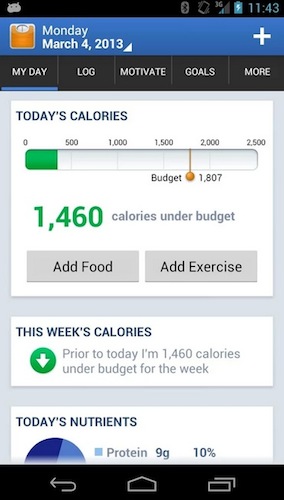 According to a small study at Arizona State University, tracking weight loss on a smartphone leads to more consistent tracking than paper and pencil. But a dedicated weight loss app -- in this case Lose It! -- did not improve tracking over simply using the smartphone's memo application, nor was there any difference in weight loss observed among the app users, smartphone memo users, and paper trackers.
According to a small study at Arizona State University, tracking weight loss on a smartphone leads to more consistent tracking than paper and pencil. But a dedicated weight loss app -- in this case Lose It! -- did not improve tracking over simply using the smartphone's memo application, nor was there any difference in weight loss observed among the app users, smartphone memo users, and paper trackers.
“While no difference in weight loss was noted between the three groups, we found that participants who monitored their diet with either an application or the memo function on a smartphone were more likely to persist in the study and missed fewer days of entering dietary data, compared to those monitoring via paper and pencil,” lead author Christopher Wharton, associate professor of nutrition at ASU’s School of Nutrition and Health Promotion, said in a statement. “This may be due to ease of use.”
The researchers studied a group of 47 volunteers across an 8-week weight loss trial, semi-randomly assigned to three groups. One group did dietary tracking with a pencil and paper, one group did the same kind of tracking in the memo application on the smartphone, and one group used Lose It!, a popular smartphone diet tracking app.
There was one difference between the Lose It! group and the other two groups -- the other groups had access to one-on-one nutrition counseling sessions and weekly reminders to eat healthy, as well as a personalized diet plan supplemented by a suggested exercise plan. LoseIt! users managed to achieve the same results without those additional resources, which could bode well for the app's effectiveness after all.
Additionally, the app group was the only one from which no one dropped out of the study: each of the other groups lost five participants who cited time constraints as their reason for dropping out.
Researchers hope that this can be a jumping off point for other dietary tracking studies using the smartphone -- many previous studies of electronic self tracking have used Palm Pilots or personal digital assistants.
"We hope that this study will lead to future research on apps that include feedback, not only in terms of calories but also in terms of overall quality, and how they could influence health outcomes," said Wharton. "We also hope that continued research will improve the choice of diet-based apps available to smartphone users, especially ones that focus on how using smartphones for diet tracking can influence diet choices over time."

















